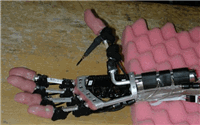
The 'Fluidhand', tested at the Orthopedic University Hospital in Heidelberg, is a prototype of a prosthetic hand that can close around objects, even those with an irregular surface. The hand feels softer, is more elastic and more natural than current prosthetic hands.
Future vision by Erwin van Lun
From all kinds of starting points we’re busy making artificial humans. Sooner or later these artificial humans will be given an individual life, they’ll act like people and we’ll treat them like people. Purely and simply because our brains can’t do anything else.



